
by Lisa Fuller | Sep 22, 2015 | Encouragement, General, Motivation, Parenting, Problem Solving, Sibling Issues
It just slipped out. I didn’t mean to say in front of the 25 parents who’d come to learn strategies to solve sibling conflict. There’s something about it that just didn’t sound right. Actually it sounded like the antithesis to everything out there selling like hotcakes in the world of public opinion parenting.
I said it. “Positive Discipline (PD) is lazy parenting.”
While that’s not exactly accurate, it can feel effortless when you’re in the PD Zone compared to the prevailing helicopter/effortful parenting mode.
Here’s what I see with parents I work with and what I’ve experienced firsthand…
You’re working so hard to parent your child in a way that will encourage them to grow into loving, responsible, contributing members of society. Let’s add a cherry or two on top and throw in hard working, honest, happy, conscious of the world around them, yada yada the list goes on.
Looking at it straight on, it’s freaking intimidating.
No wonder you’re stressed about the hitting, lying, excluding, whining, complaining, isolating, arguing and bad attituding that’s happening today.
Who has the luxury to be lazy when vigilance is required to produce the qualities you know are so important for your child’s success?
What’s clear is that while control might feel necessary, and to some degree satisfying, in the moment, control, as a parenting style doesn’t invite the long term character traits you desire.
In short, control creates hollow results. When you do it all for your child (decide it all, manage it all, enforce it all), you inadvertently rob your kids of the opportunity to practice valuable life skills that they can only learn by doing.
With ‘good character’ as the destination, your child must travel through mistake-ville which inevitably leads to growth-town. They need to learn how to solve problems and think critically about the world around them in order to become who you want them to be. And that takes practice.
I stand behind what I said. [tweetthis]Positive Discipline can feel downright relaxing at times – – – lazy even. And that’s a good thing![/tweetthis]
Here are three real life examples, featuring a variety of ages, followed by the how-to tips for effective lazy parenting.
Example #1 from Kelly:
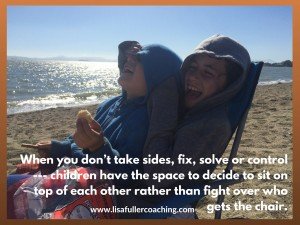 While enrolled in my spring sibling series, Kelly sent me this email after our first session.
While enrolled in my spring sibling series, Kelly sent me this email after our first session.
These pictures were taken on Father’s Day right after I used “put in same boat” technique & validation. The boys were fighting over the chair (we only had one) and I said, “hmm, one chair and two boys?”... Then Emmett had a solution. Xo
“hmm, one chair and two boys?”… elegant indeed. No refereeing or setting a timer to make sure it was fair, just a simple, observing, genuinely curious question.
 Kelly’s story reminds me that when you don’t take sides, fix, solve, control — children have the space to use their own intelligence to figure things out and come up with their own, often elegant solutions.
Kelly’s story reminds me that when you don’t take sides, fix, solve, control — children have the space to use their own intelligence to figure things out and come up with their own, often elegant solutions.
That said, if your children are accustomed to you fixing, solving, refereeing, it will take training, practice, and time for them to reach for their own intelligence when faced with a problem.
Kelly’s tool of choice in this example was to ask a curiosity question (being genuinely curious about what solution they would come up with!) while treating kids the same (in PD lingo we call this putting them in the same boat… or in this case chair!)
Example #2 from Rochelle:
I have long been critical of parents who swoop in to solve their kids’ social problems, whether they be in school or on the athletic field. But when it comes to homework, I was clearly piloting this ‘chopper.’ Despite the fact that my son was just two years away from going off to college, I was still checking the online homework program for assignments and grades on a daily basis and harping at him about the status and quality of his work.
Both of us were miserable: my son blamed me if he missed an assignment and I felt angry because he wasn’t taking responsibility for his own work. But why should he? How could he, when I was always looking over his shoulder?
This year my husband and I decided we would take a different approach, we’d let our son be the master of his own destiny, free to make his own mistakes.
It was scary; he’s a junior in high school and there’s a lot of pressure on him to do well in school. While we worried that our messy, disorganized son, would lose important papers and forget about tests or quizes, we have been more than pleasantly surprised. He has risen to the occasion.
When he forgot to do an AP assignment, he took responsibility for his inaction, contacted the teacher and asked for an extension. It was the first time I could genuinely say I hoped she would be supportive and honor his request. He’s learning to take responsibility, we’re learning to let go and let him succeed (or fail) on his own, and our relationship is so much stronger for it.
Rochelle’s tool: having faith in her son period and showing faith in him by giving him the opportunity to make mistakes and then learn from his mistakes. Rochelle is taking the long range view, knowing the lessons he will learn outweigh the in-the-moment forgotten assignments, etc.
Example # 3 from Eric:
Eric emailed me this success story while he was enrolled in my series:
Last week on my way home from work, my wife Stephanie sent me a text that our daughter Grace (5) was being a handful, was in a horrible mood, and that Stephanie had had it with her.
When I got home, I walked into the house and went straight to Grace and asked her for a hug. At first she turned her back and crossed her arms, and said no. I then decided to ask her one more time and after a 5 second pause, she turned and gave me a big hug.
Steph said it was like someone flipped a switch on Grace. Grace went from being in the worst mood to acting as if she was having the best day ever.
It’s amazing to see the kind of impact and dynamics that something as simple as asking for a hug can have on a 5 year old. Honestly, before taking your class, I probably would have come home and punished Grace for misbehaving and the entire afternoon would have been ruined for the entire family.
Eric’s tool: Asking for a hug (note this does NOT mean asking your child, “do YOU need a hug?” You spark your child’s sense of significance when you ASK them for a hug signalling that your child makes a difference to you — they’re giving you a hug has an impact.) Pretty easy.
Warning: Don’t try letting go of control once and give up when the results don’t look exactly as you’d hoped. Children need to adjust to your new behavior — they’ll test and maybe test some more until they can trust your change is enduring.
What does lazy parenting require from us?
- Flexibility – if you’re not dictating and controlling the outcome, you need to be open to a different outcome.
- Patience – when children are figuring it out they’re bound to make mistakes, a mess, etc. Beam out to remember the bigger picture — long term character building and ahhhh lazy parenting!
- Humility – finding that place inside that accepts your limits – you might not have the answer, and what a relief that you don’t have to solve every problem.
- Faith in your kids — messy faith. Their solution may not look good and the neighbors could see or hear a mess. Your belief in them, regardless of what their solution looks like, will go a long way to build their problem-solving muscles.
What Kelly, Rochelle and Eric demonstrated seemed pretty easy and parenting can be— AT TIMES — when we’ve established a relationship of trust. Lazy, or if it makes you feel better, call it ‘conscious effortless parenting’ is possible, feels awesome, and can be yours!.
I want that for you!
Share your experience of lazy parenting in the comments below. Don’t be shy.
Want to read more about this topic? Here’re some good posts:
Being “In Control” – The Possible and Impossible In Parenting from Hand in Hand
Control Freak vs. Pushover Parenting: Why Niether Works
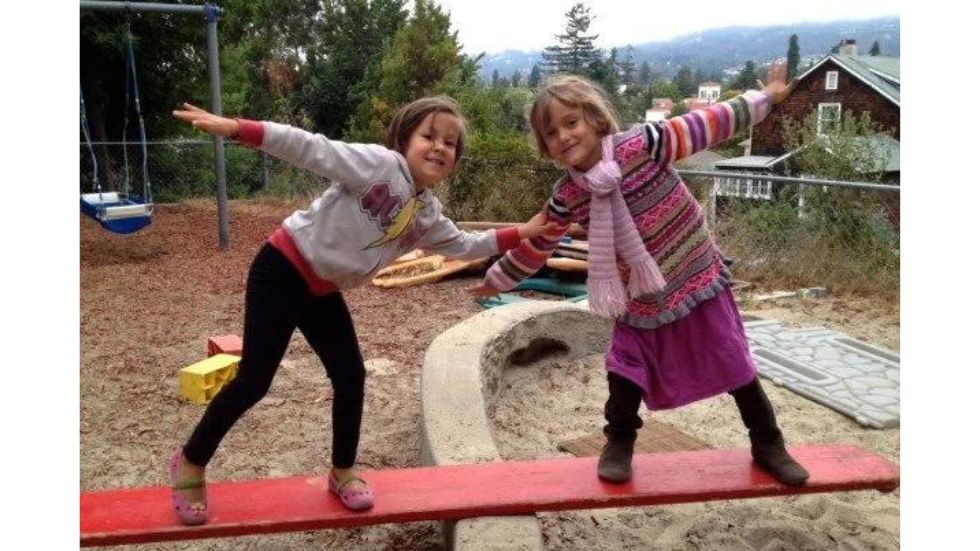
by Lisa Fuller | May 12, 2015 | Communication, Encouragement, Feelings & Emotions, General, Parenting, Sibling Issues

Practice Scripts for Parents: So you can stop unwittingly contributing to your children’s fighting
In Part One we looked at the tremendous learning that results from sibling relationships.
In Part Two we looked at the importance of staying out of your kids’ fights after establishing — and repeatedly reminding kids of — family rules and expectations. (Here’s the index with all of the resources.)
Here in Part Three we’ll explore what you do, unintentionally, to increase sibling acrimony and what you can specifically, say or do instead.
Imagine …
Scenario 1: You’re at a work meeting with your colleague (Joe) and your boss (Big Cheese). You and Joe present what you’ve been working on for the last month at which time Big Cheese looks Joe in the eye and says, “Joe what you’ve done here is outstanding work— you’re exceptional, you really are.”
Be with that. What runs through your mind, your heart?
Scenario 2: You come home after what’s been a bad day and share with your spouse what happened at work, “I just finished this huge project. Joe and I presented it to the Big Cheese, and well, you had to be there, but I felt really unappreciated. It made me feel like crap actually. I put so much of myself into that project, but he didn’t recognize me at all.”
Then your spouse replies, “You know you make a difference — the work couldn’t have been done without you. You need to remember you’re good enough whether someone tells you or not.”
Be with that. What runs through your mind, your heart?
While these are adult scenarios, what they illustrate are common mistakes we make with our children. Sometimes, daily.
The first scenario highlights the perils of praise — the non-specific superlative — and how the use of praise is particularly detrimental to the sibling bond.
How did you feel when you imagined yourself in the scenario?
In parenting class we role-play a parent praising one child but not the other. The volunteer playing the sibling not receiving praise — without exception — feels badly about themselves and usually resentful of their praise worthy sibling.
The un-praised sibling goes on to assume that the accolades lavished on sister or brother mean they’re destined to fall short… big time. Right or wrong this is a predictable human response.
In scenario 2, I’ve put the spotlight on how the denial of feelings, while well intentioned (like praise), is in fact discouraging because it communicates that we’re wrong when what we crave is to feel understood.
Below are four parent behaviors that hurt sibling relationships, followed specific examples of what they sound like and what you could say instead.
PRAISE ➜ ENCOURAGE
- Wow — you’re the fastest swimmer out there! ➜ I love to watch you swim!
- You’re such a good boy! ➜ I appreciate your help, you made my day easier.
- With more work, you’ll get it right. ➜ Look how far you’ve come, you can do it.
DENY FEELINGS ➜ ACKNOWLEDGE FEELINGS
- Just get along — she’s your sister! ➜ It sounds like you’re feeling really sad and hurt.
- Don’t say you hate your brother — that’s not nice. ➜ It looks like you guys aren’t getting along right now and could use some time away from each other.
COMPARISON ➜ DESCRIBE BEHAVIOR (put kids in the same boat)
- Why can’t you just be nice like your sister!? ➜ I can see you’re really cranky right now… come find me when you decide you’re ready to talk.
- Why do you always make things so difficult? ➜ Kids, I have faith that the two of you can work this out together. Come find me if you need help.
LABEL ➜ DESCRIBE WHAT YOU SEE, FEEL OR THE PROBLEM
- You’re the family artist. ➜ You really love to create!
- Why are you always such a bully? ➜ I see that the blocks are all over the floor, what can you do to help the situation?
- I can’t take it — you’re such a slob! ➜ Milk is all over the floor — what do you need to clean it up?
When spelled out like this, it’s crystal clear to me that [tweetthis] conscious parenting is a practice, not the default for any of us.[/tweetthis]
So it’s time to practice!
I know how hard it is so I created this Script to make it a bit easier.
Download it — print the pages you find helpful and PRACTICE.
Share your insights, questions and feedback below or write to me privately. I’d love to hear from you.

by Lisa Fuller | Apr 26, 2015 | Conflict, General, Parenting, Self-regulation, Sibling Issues
Here’s Part Two of the 3 part Sibling Series: More Good, Less Ugly: Everything you Need to Know to Foster Healthy Sibling Relationships. In case you missed it, you can check out Part One here.
A month ago, after a parent education talk (ironically, NOT about sibling issues), parents came up to me afterwards wanting to ask specific what do I do when questions.
This night each parent had a sibling challenge that deeply distressed them — and they wanted advice on how to work them out — how to FIX them.
After each told me their story of fists, tears, tussles and injustices, I asked, sincerely, so you want this to stop because ________?
It sounds like a joke but I was serious.
Here’s a snippet of their answers (and my thoughts):
- I don’t want my kids to fight. Period. (We get confused thinking peace equals the absence of conflict — not true)
- I’m afraid my children will seriously hurt each other — (it won’t happen if your kids have some skills — it makes sense to focus on teaching these skills).
- I was mistreated and abused by my siblings and my parents did nothing (if you’re reading this post, or trying to understand the issues, you’re not doing nothing. You’re learning how to respond rather than react).
It’s important for you to get to the bottom of your frantic need to end sibling fights.
When you feel desperate, your children tune into your urgency and — baBOOM! — their fights gain greater importance and power.
No matter what age they are, you can see the wheels turning in their mind… “Hey, I’m onto something here — mom’s lost her mind over this bickering — it’s energizing to have her so plugged in so I’m going to persist and/or do it again soon.”
[tweetthis]Even if a child is scared, negative engagement with you is better than the alternative, no connection[/tweetthis]
Your children are wired to get your attention (think survival) and this sibling stuff is just the ticket.
So what if you don’t react when the fight breaks out, and instead acknowledge them by:
- Letting them know you notice what’s going on and you’re here if they need your help (hint: think of yourself as a consultant rather than a cop) or
- Saying, “I can see you’re struggling with each other and I have faith that you’ll be able to work it out together.”
What’ll happen next? They’ll be flabbergasted that you haven’t jumped in to fix or solve.
Jane Nelsen says surprise leads to confusion. When a child is confused because she doesn’t get the reaction she’s used to, she’s ready to consider a new behavior.
- If the surprise results from a respectful interaction, her confusion will include a feeling of belonging and encouragement, so her new behavior is likely to be positive.
- If the surprise is a result of disrespect, then her previous misbehavior is likely to intensify.
After a recent sibling talk I got this email from a mom who’d bravely tried what I’d suggested, the very next morning:
Hi Lisa,
I wanted to tell you my success story from this morning. I feel like one of the examples from the book (Siblings without Rivalry), I was so surprised at its effectiveness!
This morning my 5.5yo son Eden left his favorite transformer toys on the floor, and his 1.5yo sister Lulu ran to them and started playing. He saw that, ran over, and pushed her backwards so her head banged the floor (she’s had worse bumps, but it was still rough and it hurt her).
I calmly went over and said, “Do you two need some help? Lulu doesn’t know why you pushed her. Use your words to tell her. I know you two can work this out. I’m going in the kitchen now so you can work it out.”
I walked away as Lulu whimpered a few times, just sitting next to her brother, probably unsure why I hadn’t defended her better.
Only 5 to 10 seconds after I walked away, Eden said, “Hey Louie, do you want another one?! I’ll get you one!” and jumped up to get her the one transformer he wasn’t playing with. He gave it to her, she happily accepted, and she scooted away a few inches to play with it in her own space.
I COULDN’T BELIEVE IT! It was exactly like the book and you said it would happen! Even though it worked so well, I admit I felt a bit guilty about seemingly abandoning Louie to her big brother in a moment of distress. But I get that their relationship benefitted from his problem-solving so much more than if I had stepped in.
Based on the book, if we can be consistent with this kind of conflict resolution, soon both kids will not feel this as abandonment, but as empowerment instead.
–Rachel
This story beautifully illustrates that [tweetthis]you don’t stop teaching your kids just because you don’t get involved in the moment of conflict.[/tweetthis]
Rachel admits the guilt she felt in trying a new behavior — I think many of us don’t try new tools and responses, even though they may be more effective in the long run, because of the dreaded parent guilt – what’ll happen if it doesn’t work?.
There may be times when you want to step in — how do you do that without fixing?
Here are three Positive Discipline Tools to help in the moment with a dispute between young children:
- DISTRACTION — “I’ll give you something else to do now.”
- SEPARATION — “Let’s move you over here for now.”
- PUTTING KIDS IN THE SAME BOAT and recognizing that CHILDREN DO BETTER WHEN THEY FEEL BETTER — “I’d like to read you both a story now – it will help put us in a good mood. Then you can try to play together again… when you both feel better.”
So often when you plunge into a sibling fight, you think you know what’s going on.
This week, pretend you don’t and put the kids in the same boat.
Do your best to stay out of their business (or consult from the sidelines), and see what happens.
Please share your thoughts in the comments below.
If you’re not already on the list, sign up to receive Part 3 of the Sibling Series: From Squabbles to Sharing: Proven Strategies to Improve Sibling Relationships by email.

by Lisa Fuller | Apr 13, 2015 | Communication, General, Parenting, Sibling Issues
Sibling strife is a hot button issue. When I started writing a post on the topic it quickly became clear that I was going to write a Sibling Series to scratch the surface of this multifaceted issue.
Part One: Don’t Worry: There’s Hidden Treasure in Sibling Battles
Part Two: Your Surprising Role in Sibling Fights (& How to Change it)
Part Three: What You Say Either Helps or Hurts Sibling Relationships
Additional Resources
It’s my hope that these posts and resources inspire consideration, conversation and ultimately a deeper understanding of how we can encourage greater harmony between our children.
As always, please share your insights below in the comments. And if you’re not already receiving updates directly to your email, join me.
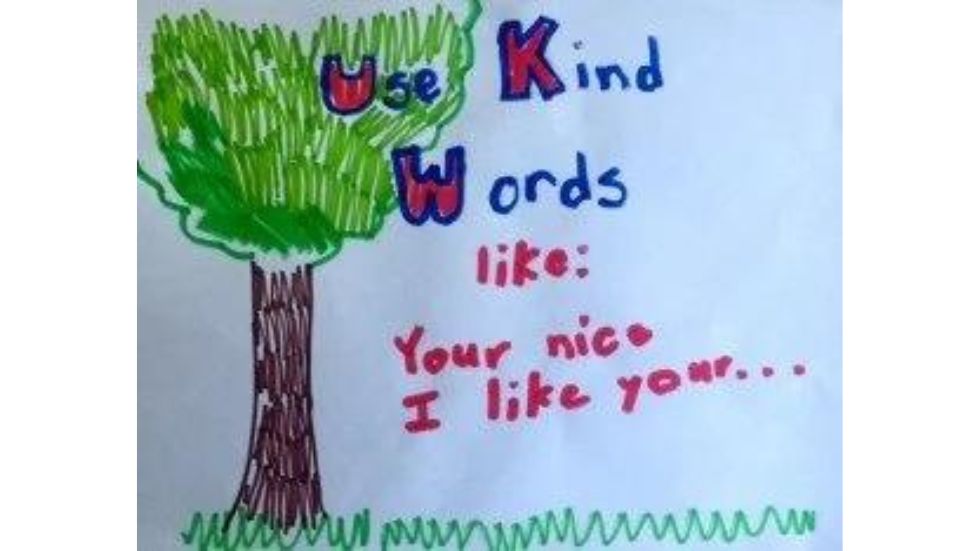
by Lisa Fuller | Apr 13, 2015 | Communication, General, Parenting, Sibling Issues
My oldest went off to college in the Fall, leaving his two younger siblings behind.
I wondered how his leaving would impact our family dynamic. And now, seven months in, I have an idea (hint: it’s not pretty).
What’s emerged is a fierceness between the remaining two. It’s like a cushion has been removed and now there’s the raw friction of two hard stones, one sharp (older one needing to be boss) and one holding firm (younger showing resolve to hold her own).
Side note: when I spoke to the kids about how I’d be depicting them for this article, they argued that they were each the one standing firm while the other was the nudger and antagonizer — confirming that there’s never “one true story” of what’s going on….
It reminds me of what Ken Kesey wrote in One Flew Over the Cuckoo’s Nest, “It’s the truth even if it never happened.”
Because I’ve parented for a while now, I know this dynamic, whatever it is, will change. It always does. But sometimes a simple dinner with the two of them is akin to nails running down the chalkboard. I’d love to run screaming from room and it makes me wonder, HOW IN THE WORLD DID I CREATE THESE MONSTERS?!
The other night at dinner we talked about what we could do to help improve the situation. My daughter (the younger one) decided that she’d make signs reminding us all of important relationship behavior.
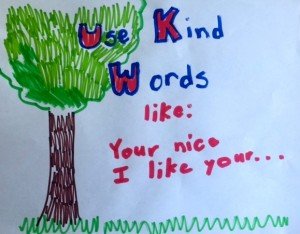
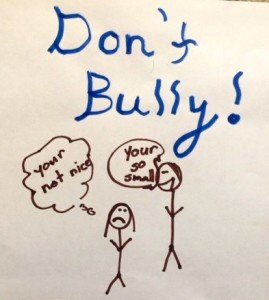
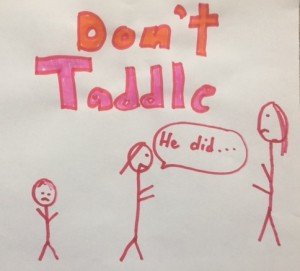 I love how her drawings show different perspectives.
I love how her drawings show different perspectives.
Once she’d created them she didn’t care to hash it out any further….
This is often the case with kids — it’s the DOING that’s important — not the processing.
Since she made these reminders, I’ve actually noticed more harmony – crazy magic.
The good the bad and the ugly news is that sibling issues, while highly irritating and button pressing, are normal and to be expected.
If you had brothers and sisters, think back to your own childhood… what did you learn from them?
Here’s a list from parents in my Parenting with Positive Discipline series:
- how to tease
- how to manipulate
- how to negotiate
- how to take turns/share
- how to stand up for someone
- how to keep company
- how to eat fast
- how to hate intensely
- how to love intensely
- how to be loyal
- how to fight
- how to defend
- how to ask for what you want or need
Sound familiar?
[tweetthis hidden_hashtags=”#parenting, #sibling battles”]We learn invaluable life lessons from our siblings.[/tweetthis]
My sister recently shared Jeffery Kluger’s Ted talk, “The sibling bond,” with me and my brother. Mr. Kluger tells stories illustrating the powerful influence siblings have on each other.
Here’s what stood out for me:.
There may be no relationship that affects us more profoundly than that of our siblings– none closer, harder, sweeter, happier, sadder, more filled with joy or fraught with woe than the relationship we have with our brothers and sisters. The sibling bond can be a thing of abiding love, our parents leave us too early, our spouses come along too late, our siblings are the only ones who are with us for the entire ride – over the arch of decades – there may be nothing that defines us and forms us more powerfully than our relationship with our brothers and sisters.
Siblings learn when to stand up for themselves, when to stand down – love, loyalty, honesty, sharing, caring, compromise, the disclosure of secrets and the keeping of confidences.
Siblings may be among the richest harvests of the time we have here.
And finally (I’ve paraphrased),
[tweetthis]Your sibling is someone you’ve road tested life with before having to get out there and travel it on your own.[/tweetthis]
Will it impact how we respond to sibling fighting if view it through this lens? I think so. Relationships are messy — we’re all learning all of the time.
When nails scratch their way down the chalkboard, take heart. Know you’re in good company. Breath, remove yourself if you can, and remember that tremendous learning is happening.
This week view sibling battles as opportunities to learn life lessons. Notice what’s being learned in your house? Notice what lessons you’d like to see more and less of and share in the comments below.
Stay tuned for Part Two: Your Surprising Role in Sibling Fights (and How to Change it)
Wanna talk? It’s easy to schedule a time here.
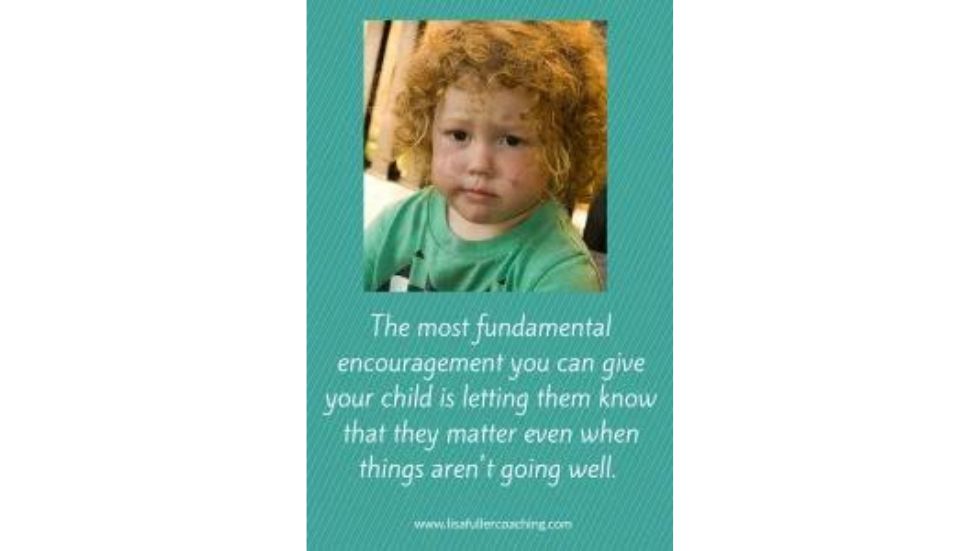
by Lisa Fuller | Jan 14, 2015 | Encouragement, Parenting, Self-regulation, Sibling Issues
During a parent education evening last week, I rattled on about the importance of encouragement in parenting and shared my favorite slogan, “Children Do Better When They FEEL Better.” Then an arm shot up.
One of the parents, Sarah, looked sincerely puzzled and asked a simple question that got every head in the room nodding:
“Encouragement and Positive Discipline are great when it’s a low stakes situation, but what about when safety is involved? How should I respond to a threat of physical harm from one of my children to the other in a positive way?”
When I asked her to explain her situation, Sarah told the following story (which may be very familiar to anyone with children close in age and remembers, or is going through, the baby/toddler sibling combination):
It was the end of the day, about an hour before my husband got home… typically my roughest time. Gus (3) was zipping around the house on his tricycle when he headed straight for his little brother (6 months), stopping just a hair from Fisher’s little fingers. I told him not to do that, that he could hurt Fisher and it didn’t feel safe to me. A minute later, he did the exact same thing and I basically flipped my lid. I yelled, “STOP,” stormed over to Gus, pried him from the tricycle, and let him cry on the ground as I put the trike outside. I felt really protective of Fisher and that I needed to stop Gus. I felt awful for yelling and reacting in a physical way because he was so sad afterwards. But how else could I show him that I was in charge?
Sarah’s story highlights the primal nature of being a parent. We’re hard-wired to protect our children from a perceived threat, even if that threat is their sibling. Keeping your children safe is your first priority as a parent and if a quick intervention — sometimes ungraceful or inflated — is urgently needed to protect a baby or younger sibling from harm, you need to do that, and quickly.
But I encouraged Sarah (as I would any parent) to turn from the immediate danger to look for connection and encouragement with the older child instead of punishment. I know this sounds crazy and counter intuitive but here’s what Positive Discipline teaches us:
The most fundamental encouragement you can give your child is letting him or her know they’re significant even when things are not going well.
(Significance here means has value, has meaning, matters to you and to the broader community, etc.)
What does encouragement look like in this situation? How can Sarah communicate that Gus has significance?
Sarah could physically block the trike from Fisher’s path (as it does not appear that Gus intended to stop on his own) and take a deep breath (essential in such a case).
Rather than lifting him off the trike right away, she could gently and firmly lift just Gus’ hands off the handlebars, look into his eyes and say:
Gus, wow, my he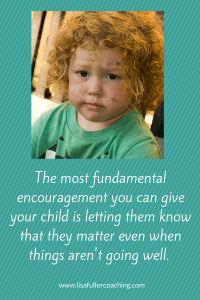 art is beating really fast because you really scared me by coming that close to Fisher’s hands. (Pause and breathe.) I could use a hug right now – could you give me a hug? Let’s bring your brother in, I bet we could all use a hug to feel better.
art is beating really fast because you really scared me by coming that close to Fisher’s hands. (Pause and breathe.) I could use a hug right now – could you give me a hug? Let’s bring your brother in, I bet we could all use a hug to feel better.
If this feels impossibly warm and fuzzy in such a potentially dangerous situation, consider this story from Gus’ point of view.
Rather than feel punished and sad (as he clearly did when the trike was chucked outside and he was left crying), Gus might think, “I did something wrong that really scared my mommy. What I do has an impact. I’m important to mommy and I can even help her feel better.”
The most fundamental encouragement you can give your child is letting them know that they have significance, even when they’re misbehaving.
In this scenario, asking for a hug is encouraging – very different than offering a hug because you’re engaging your child in being part of the resolution in an active way.
CHILDREN DO BETTER WHEN THEY FEEL BETTER! (we all do!)
Even when our children misbehave – if we can take steps to help them feel better, rather than making them feel worse, we are much more likely to encourage the kind of behavior we want to see from them in the future.
4 Steps for changing our response from punishment to encouragement:
- Shift your assumptions: Work on moving from my child will learn to behave by being punished to my child will learn to behave by getting the message that he or she matters.
For an example Sarah also shared a story of how she “felt a shift from the tricycle incident” just the day after my presentation. She wrote:
Gus was standing on his stool near the stove where I was getting ready to cook an egg. He tossed the hot pad that was on the counter onto the hot pan. I exclaimed surprise and got the pad out. I told him that was really scary and we absolutely do not throw things on the pan. He didn’t seem to be doing it out of defiance, which probably helped my reaction just be scared and then clear. But it was like we were scared together, learned something, and then moved on. No tears, no drama…so much better. It just gave me a taste of what you were talking about.
- Plan ahead: We’ve all yelled at and lost it with our kids, but by thinking through possible responses to common challenges ahead of time, we have a greater chance of pausing and consciously responding rather than giving our knee jerk reaction.
For example, I have a son who leaves what I call anonymous messes quite regularly around the house. This is a common challenge that I’ve planned ahead for by deciding on a few ways to respond when I’m next faced with his mess. Just yesterday, I found what looked like spilled detergent on the floor near the washing machine, covered with pillow cases. I suspected he left this mess and rather than simply accuse him and rant AT him for not taking the time to clean up, when I saw him I’d calmly asked a few clarifying questions, had he been doing laundry (yes), did he know about a spill, (why yes he did — this fessing up is progress), what could he do about it now? (This is a challenge for me but staying calm and building cooperation — progress, not perfection — is a huge victory for me and the only way I can do it is by planning for it).
- Assemble your parenting toolkit: Know your game plan by having tools at the front of your mind (Such as, “I need a hug,” asking WHAT & HOW questions like “what’s your idea to solve this problem?”). Sort through the Positive Discipline Tool Cards and pick three you’d like to try.
- Get support: Reach out for professional support. Even if it’s not with me, find someone who can help you weather the shift and put this new approach into action over time. It’s about progress — not perfection!
Regardless of the age of your child, encouragement through connection, in place of punishment is life changing — for both parent and child!
Please share in the comments below simple ways that you can remind your child of their significance (that they matter) today. In doing so, you’re giving us ideas that will encourage us to plan ahead – step 2 above! We’re all in this together 🙂
If you haven’t already done so, join me on this journey!
Wanna talk? Schedule a time here.

 While enrolled in my spring sibling series, Kelly sent me this email after our first session.
While enrolled in my spring sibling series, Kelly sent me this email after our first session. Kelly’s story reminds me that when you don’t take sides, fix, solve, control — children have the space to use their own intelligence to figure things out and come up with their own, often elegant solutions.
Kelly’s story reminds me that when you don’t take sides, fix, solve, control — children have the space to use their own intelligence to figure things out and come up with their own, often elegant solutions. 







 I love how her drawings show different perspectives.
I love how her drawings show different perspectives.
 art is beating really fast because you really scared me by coming that close to Fisher’s hands. (Pause and breathe.) I could use a hug right now – could you give me a hug? Let’s bring your brother in, I bet we could all use a hug to feel better.
art is beating really fast because you really scared me by coming that close to Fisher’s hands. (Pause and breathe.) I could use a hug right now – could you give me a hug? Let’s bring your brother in, I bet we could all use a hug to feel better.
